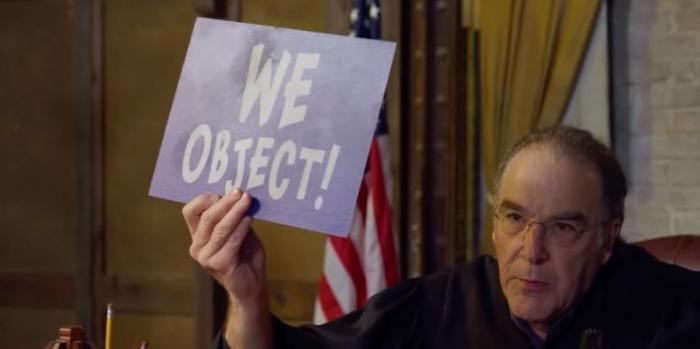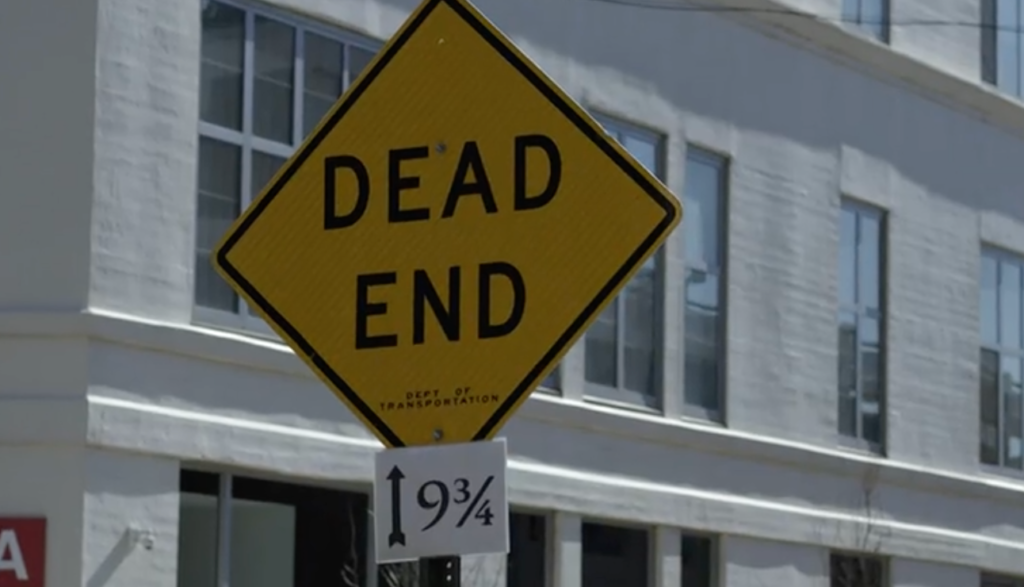The latest court judgment on the PSR suggests the ethical and moral context in which it works is murky at best and a farce at worst.
In a recent episode of the US legal drama The Good Fight, the team find themselves directed out of the formal court building they turn up at to run their case, around the corner and into the back room of a photocopying shop, to Court 9¾, a take on platform 9¾ in Harry Potter.
Court 9¾ has no legal jurisdiction, isn’t overseen by a formally recognised judge, and has no power to force either the plaintiff or defendant to do anything based on its findings. It’s a court where an ex-judge, weary of the legal trickery, game playing and bureaucratic constructs of the formal legal process, decides to set up an alternative courtroom where logic, efficiency and ethics are the primary considerations in arriving at more balanced judgements.
The idea of Court 9¾ isn’t so far-fetched.
It’s an unusual – and possibly quite effective – form of arbitration, a process some litigants will attempt before getting into much more expensive legal proceedings.
If the recent case of Yoong vs The Chief Executive of Medicare had been forced to court 9¾ prior to it being heard in Federal Court earlier this year, a bit of logic, ethics and an ability to ignore insanely complex legal constructs, would almost certainly have seen the federal government lambasted by Judge Wackner (the fictional judge in the series) for persisting with processes that are opaque, error prone, often illogical (guilty by statistical anomaly), and taken as a whole, can’t ever hope to deliver “procedural fairness” to doctors.
But that’s a TV show.
The Federal Court is the real world for doctors entangled with the PSR, and all the formal legal constructs, mad or not, tend to apply. And Yoong fell into some pretty deep and expensive constructs.

Thankfully, it doesn’t seem to be all strange legal constructs and madness in Federal Court.
In the March hearings for the PSR case Karmakar vs Minister for Health MP Greg Hunt, one of the judges, in reference to the effect of the confidentiality clause 106ZR of the Health Insurance Act, described the PSR process as not being dissimilar from that of a “star chamber”.
When the judgment in the case of Yoong vs The Chief Executive of Medicare emerged last month, the initial reaction from those in the know about PSR cases was that Dr Yoong and his legal team had probably missed a trick. It may have been a wasted opportunity to expose some serious flaws in the logic and process of how the PSR is operating.
The team defending Dr Yoong in the end got hung on a legal technicality. Dr Yoong had wanted to see “procedural fairness” from the outset of his being identified as a potential offender. But that’s not how the judge read how things work with the PSR – and he’d read a lot. The judged explained in much detail that when the Department of Health has identified a potential wrongdoer and simply wants to hand that identification onto the PSR for assessment of what to do, no one has any right to “procedural fairness”.
The decision essentially says it’s fine for the government to ID you as a potential Medicare bandit and no one has to be “procedurally fair” in coming to that conclusion.
This seems pretty rough given the Department’s main identification tool is statistical analysis and probability not any elements of fact. And the Department sets the terms of that probability calculation and doesn’t let anyone know how they set it. In addition this “outlier analysis” they do has already proven on occasion to be prone to issues of improper input – usually around context of reference points (averaging apples to assess oranges?). In other words, it’s known not to work on occasion.
Great. We can use data to make a mathematical guess you might be an offender, but if there are obvious flaws in that process that I can point out to you up front, you can ignore them if you want. And then you can spend taxpayers money defending your decision to ignore them, if you like.
What next?
Yoong lost the case. Essentially, don’t whinge that we need to be fair in how we identified you as a possible culprit here. Trust our statisticians – we do.
If you could at this stage of the process prove that the Department of Health had done something stupid, wouldn’t you allow for that possibility at least and leave room for some process? As things stand in the Dr Yoon case, hundreds of thousands were spent in working out that Dr Yoon shouldn’t even have tried.
Given the complexity of the judgment, and legal teams assembled on both sides to do battle – Minter Ellison for the Defence, and Clayton Utz for the government – Yoong lost big time – so far at least, as he was ordered to pay costs. He may be covered by insurance to some degree but at a guess, costs for both his team and the government are going to exceed $400,000.
Ouch. No wonder we don’t see a lot of these cases being fought overall against the PSR.
The case probably isn’t over.
I can’t imagine Minters or Dr Yoong stopping yet as there will surely be lots more to argue about once the PSR process enters a stage of the process where the Federal Court deems, in some very legally complex and bureaucratic way, that procedural fairness can be applied in the process of investigation. Mind you, by this time Dr Yoong is out about $400,000 and may not want to go for round two.
I’m not a fan of people saying “I’m no lawyer, but…”, but, I’m no lawyer. ( I did actually go to law school once a long time ago…it was much easier than software engineering and the students were much more fun).
I’m almost certain that any reading I make of this case will be wrong in some technical way (or worse) and a real lawyer somewhere will be rolling their eyes at how misled and naïve I am in even attempting to write about the topic.
Which is actually the point I want to make.
If it takes the most expensive legal firms in the land, and a judge of the Federal Court deliberating for several months, in a long, technical and complex judgment to try to ascertain if things are legally fair or not, and the PSR process hasn’t even really gotten going in this case, there is something very wrong which should be very plain for the federal government and the Chief Executive of Medicare to see.
It’s conveniently too complex and opaque.
It’s looks suspiciously, deliberately too complex and opaque.
Business can work this way as well. Blind the punters with complexity, technicalities and cost. Don’t make it worth anyone’s trouble digging into what is really going on.
I’ve been passed along a quote from a GP social media forum that puts it distressingly clearly:
“It’s like driving alone down a road with no visible speed signs and no one will tell you the limit but then you are pulled over and handed a massive speeding fine.”
I think I can usefully add to this GP’s analogy.
It’s sometimes like driving down a very dark and winding road in the mountains when it’s raining and there are none of those friendly yellow and black signs with curvy arrows on them, and a speed suggestion, to stop you from taking a sudden hook bend at 90km/h when the maximum survivable speed is 35km/h.
I’d love Judge Wackner of Court 9¾ to issue a judgment on these statements in the context of what happens if a doctor actually finds themselves entangled in the PSR process.
Just being identified by the crack “stats guys” in Medicare for being what they regard as an “outlier” and getting that first letter is a harrowing experience.
Is it really fair if the crack stats guys aren’t even prepared to publish a table of their fine work outlining all the outlier points they’ve come with over time which might ID you as a possible culprit (they must have a lot of those data points by now). Maybe they could even put a little commentary around how they came up with their points. That’s called transparency.
Such a table is what that GP on social media is pretty clearly begging for.
Well-marked and common-sense road signs.
If you have a lot of accidents on a tricky mountain road over a short period of time, you are going to put up some warning signs eventually for the punters. Not apparently if you are the PSR.

The idea of having to publish a table of statistical speed signs for doctors, or anything else that has been established from past cases, forms some of the basis of Dr Anchita Karmakar’s case against the PSR. If the Department of Health, using clause 106ZR for cover, won’t publish what logic and reason that a panel of your peers comes up with each time they condemn a doctor for inappropriate clinical practice, how can every other doctor avoid falling into the same speed traps?
Not wanting to offend the lawyers and judges out there, but it very obviously is not fair, and no amount of sophisticated legal wrapping could make anyone think it is. Worse, in the context of the role of government, it makes no sense at all to keep confidential any. information from previous cases which would help doctors triangulate their location in reference to a potential nearby cliff face.
No well-marked speed signs here.
Not even a thought about putting them up?
The Department of Health argues the reason it won’t publish the assessments and judgments of their panel of peer doctors when determining a PSR case is because it would potentially infringe the privacy of patients.
This isn’t a good argument. It’s in fact such a poor excuse, it raises even more questions than we’ve asked here about what is actually going on.
Patient privacy can easily be protected while such assessments are made and are published.
This weird obsession with not letting anyone in on what the actual standards are by which doctors have been judged in the past, is what led to the Federal Court judge in the Karmakar case labelling the PSR a “star chamber”.
As things go, not many doctors actually get the PSR ID letter thankfully (we are not here talking about nudge letters, which are a different but related fear tactic to keep doctors guessing and are far more abundant in the system).
But the fear of getting the letter is widespread. And this looks like a tactic.
The fear of getting a nudge letter is far more widespread and is a fear tactic designed to alter behaviour. A nudge letter is a “we’ve been watching you and you look like you might have been doing a bit of speeding, we think, be careful”, not a “welcome to the PSR process letter”. There’s a big difference.
The damage to the welfare of patients created by this system of leaving doctors in the dark without clear speed signs or navigational aids is pretty obvious and should be of some concern to both the public and government.
Short of reasonable and fair navigation aids, and being in the dark, doctors are going to become generally a lot more conservative in how they manage their patients against certain item numbers. If there are no signs on that mountain road, after the very first crappy bend we encounter, most of us will slow down to a speed that we think is safe to handle the worst bend on the road. We end up going much slower than we need to go.
In patient terms we don’t manage them as well as we could.
This fear technique, might seem to lower the cost of Medicare but it probably does the opposite.
Fewer items billed, less cost is a bit simplistic if your really trying to build a good system for your patients at low cost.
In the long run, if doctors are watching their back in how they perform because they are trying to keep themselves well out of the way of the PSR, how is that good for the patient or the costs to the system?
It’s hard to work out why the Department of Health is resisting a very logical request by doctors to provide them with some sensible signposting to prevent their going off the road.
What is the downside of revealing all the past findings of the peers in every PSR case so doctors can see plainly where doctors in the past have gone wrong, or publish a table of what the stats guys in Medicare think constitutes an outlier point?
If you really want standards you need to publish them so they are able to stand up to scrutiny over time by various interested parties. It’s no good to anyone keeping them secret. It creates more overall risk that whatever standards have been set could be wrong because they’ve not been subject to realistic scrutiny.
One theory goes that if the Department of Health did do this, it might reveal some horrific inconsistencies in the standards set by peer groups in like cases, in the past (I say standards very loosely here).
It could open up a can of worms.
It wouldn’t be great PR for the department for sure.
It isn’t a bad theory.
It’s a much more logical reason to withhold the information than claiming that somehow patient confidentiality will be endangered (there are easy processes to protect patients in these assessments).
So why can’t the government step back and do some grandfathering here as a pragmatic first step, at the least?
From the next case on, publish the reasoning established by the peer committee, and from that point on build up a database. It might not take that long given that PSR cases tend to be around a very select number of Medicare items.
We might not have that long to wait for that next case in this long-running saga. It will probably be Karmakar vs The Minister for Health, which had its last hearing in late March this year and is due for judgment soon.
Note: Because of the complex legal nature of much of the subject matter in this article, and that I’m no legal eagle (nor that well versed in the legal nuances of PSR cases), I recommend that if you’re interested in this topic, you tune in this coming Wednesday to our Money & Medicine newsletter, where someone who does know a lot more about this topic, Dr Anchita Karmakar, will be reviewing the most recent PSR cases, and providing what commentary she is legally allowed.


